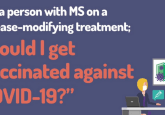The potential accumulation of gadolinium in brain tissue from gadolinium-based contrast agents
The latest update on the potential accumulation of gadolinium in brain tissue from gadolinium-based contrast agents.
On the 10 March 2017, the EMA’s Pharmacovigilance and Risk Assessment Committee (PRAC) recommended the suspension of the marketing authorisations for four linear gadolinium contrast agents. This is due to new evidence showing that small amounts of the gadolinium contained in these linear contrast agents are deposited in the brain. Contrast-enhanced MRI is a powerful tool at the disposal of the neurologist for the diagnosis of multiple sclerosis, as well as the monitoring of MS disease activity and response to treatment.
In this video, Professor Paul Matthews (Imperial College, London, UK) summarises what is currently known about gadolinium-based contrast agents, and why the risk of small gadolinium deposits in the brain differs between different types of these agents. He also provides practical recommendations on how to minimise the long-term risk from exposure to gadolinium chelates from MRI by selecting macrocyclic agents, and by using alternative MRI measures that can be a surrogate for contrast-enhanced MRI.
Sign up to Neuro-Compass for free at www.neuro-compass.education to view more Hot Topic articles and for access to extensive clinically relevant education from MS experts.


